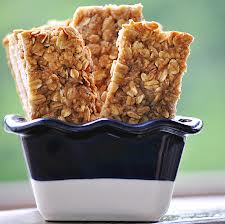
Here are some foods that you may think are good for you but, let me show you what I am talking about.....
- Multi-grain and Wheat Breads: Terms such as "multi-grain", "7-grain" and "wheat" sound healthy on the package, but the breads inside may not actually be made from heart-healthy whole grains. Many types of breads are labeled "multi-grain" and "wheat" are usually made with refined grains, (bad for you). True whole grains are made without processing and everything stays intact. How can you be sure you're getting 'whole grain'? READ the nutritional label carefully...if the first ingredient is refined flour, or it says 'bleached' or 'unbleached' enriched wheat flour, you are not getting 100% whole-grain bread. The first ingredient must say, 100% whole wheat.
- Vegan Baked Goods: Just because a baked good is vegan doesn't mean it's healthy. Vegan products can pack just as many calories, sugar and fat as traditional baked goods. The problem with vegan baked goods is that consumers see natural ingredients such as evaporated cane juice, agave nectar, vegan chocolate chips and coconut oil, and just think that these ingredients are healthier than traditional sugar, dairy and flour. Well, a vegan chocolate frosted cupcake typically contains 350 calories, 18 grams of sugar and 22 grams of fat per a 2 oz serving....not so healthy!!
- Fat-Free Salad Dressing: When trying to lose weight, salads are the perfect lunchtime meal or light dinner, UNLESS you top this nutritional powerhouse with fat-free dressing. Many people think that by using fat-free dressings they are choosing a healthy product, but by taking the fat out of the product, the food industry is replacing it with all kinds of ingredients that are as unhealthy for us as all the fat! For instance, many bottled dressings have high fructose corn syrup in them...this is extremely unhealthy for us....as well as a list of other chemicals.
- Reduced -Fat Peanut Butter: Reduced-fat peanut butter is not necessarily a healthier version of regular peanut butter. Both regular and reduced-fat contain about the same amount of calories, but the reduced-fat version has significantly MORE SUGAR. Regular peanut butter is a natural source of the "good" monounsaturated fats. Research has shown that people who include nuts and nut butters in their diets are less likely to develop type 2 diabetes and are protected from heart disease. Look for a natural peanut butter with an ingredient list that contains NO ADDED oils, cane sugar or trans fats. Better yet, find a store where you can grind your own!
- Energy Bars: Energy bars are the perfect snack, right? Not so fast....many energy bars are filled with high fructose corn syrup, added sugar, and artery-clogging saturated fat. In addition to all that, they are often laden with synthetic ingredients we can't even pronounce. Some energy bars, particularly the "meal replacement bars", contain more than 350 calories each! If you are grabbing a snack to go, try 1/4 cup of trail mix instead. If you must reach for a bar, choose one made with dried fruits, nuts and whole grains...and remember, READ the label!
- Bran Muffins: Most bran muffins are made with generally healthy ingredients...bran is rich in fiber, omega-3 fats, protein vitamins and minerals. The problem is, today's commercially available bran muffin is the portion size. A random sampling of some coffee and restaurant chain bran muffins showed that many were 350 calories a piece, and that's before adding any butter or jam to it. In addition, the bran muffins contain 600 mg of sodium, that's about 1/3 of a day's maximum amount. If you want bran muffins, make your own using mini muffin tins.
- Packaged Turkey: Again, people think they are choosing wisely, but packaged turkey slices are loaded with sodium, preservatives and nitrates to extend their shelf life. A one 2 0z serving can contain nearly 1/3 of the maximum recommended daily sodium intake.
- Foods Labeled "Fat-Free": Fat-free DOESN'T mean calorie-free. Foods that do not contain fat are not automatically healthy foods. Fat-free foods lack flavor, so to give them more tastiness, food companies pour in other ingredients such as added sugar, thickeners and sodium. Remember, there are many healthy naturally fat-free foods....vegetables and fruits!!
- Canned Soups: Many dieters turn to soup as a convenient method to control calories and reduce portion sizes. The trouble with canned soups is that even when labels state, "100% natural,l low sodium and reduced-fat", healthy consumers still need to check the nutritional information and ingredients for sodium and fat content , as well as artificial flavors and preservatives. Some soups contain as much as 800 mg of sodium per serving, and the actual serving size is only half the can!! Solution, make your own and freeze in individual serving sizes!!
- Baked Chips: If you are one of the people searching for baked chips instead of fried, you might be surprised to hear that the fried chips may actually be a better choice. Here's why: While baked chips do reduce the fat content of chips, they don't offer as big of a calorie savings as you might expect. In fact, many chips that say they're baked have just 20 fewer calories compared to their fried full-fat counterparts. In addition, because fat is filling, you may actually eat more calories when enjoying backed chips because they provide a higher carbohydrate to fat ratio than fried potato chips. When we think we are eating healthier, we sometimes eat larger servings....
These foods are just a few examples of what we think might be good healthy choices, but that's not always the case. So, the most important thing to do when shopping is READ THE LABEL...the INGREDIENT LABEL....or, just do what I do, follow the 5 ingredient rule, or better yet, buy foods that have no label!!
 RSS Feed
RSS Feed
